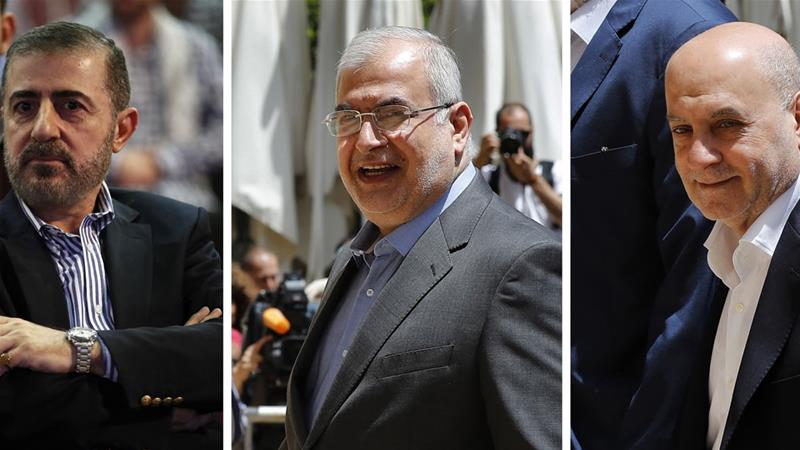BEIRUT (AP) — Under tight security, Lebanese lawmakers on Tuesday began discussing the draft 2019 state budget that aims to avert a financial crisis in the heavily indebted country by raising taxes and cutting public spending. The discussions were being held amid limited protests against proposed austerity measures. The proposed budget aims to reduce the […]

by saudigazette.com.sa —JEDDAH — Custodian of the Two Holy Mosques King Salman received at the Al Salam Palace here Lebanese former prime ministers Najib Mikati, Fouad Siniora and Tammam Salam on Monday according to the Saudi Press Agency (SPA). During the meeting, they reviewed the bilateral relations between the two countries and highlighted the Kingdom’s keenness on Lebanon’s security and stability and the importance of preserving Lebanon within its Arab environment. Former Prime Minister Mikati, after meeting King Salman, said that Saudi Arabia will “extend a hand of support to Lebanon.” The King “stressed the necessity of preserving Lebanon and soon there will be Saudi steps towards the Lebanese state,” Mikati told Lebanon’s LBC TV. “Our concern is saving the country in light of the difficulties that we are going through,” he said. Another former prime minister Siniora told Al Arabiya that Saudi Arabia has always stood by “all of Lebanon with all of its components.”
BEIRUT, (Xinhua) — Prime Minister Saad Hariri vowed Monday to implement UN Resolution 2433 aimed at empowering Lebanon’s maritime forces, a statement by the PM’s office reported. “I am fully dedicated to further develop a plan to increase the Lebanese naval capabilities,” he said. One of the steps that will be taken by the government […]
by Joe Sommerlad in tech — Amazon, the all-conquering if lightly taxed online retailer, is celebrating its 25th birthday this month. The company was founded as “Cadabra” in Bellevue, Washington, by entrepreneur Jeff Bezos on 5 July 1994, initialling selling only books before branching out gradually into almost every other facet of commerce, shifting electronics, homeware and clothes, entering the […]
by thenational.ae –Hayley Skirka— Low-cost airline Ryanair has announced new direct flights from Beirut to Pafos. Commencing on October 30, the service will fly three times a week from the Lebanese capital to the southwestern city in Cyprus. Fares are currently on sale from just Dh90 one-way, with flights departing Lebanon on Mondays, Wednesdays and Fridays. […]
By Aidan McLaughlin mediaite.com —– Boris Johnson, the mop-haired politician most likely to succeed Theresa May as U.K. prime minister, faced intense questioning from a BBC anchor over his response to President Donald Trump’s harsh words for a British ambassador. Trump leveled a brutal attack at Sir Kim Darroch, the U.K. ambassador in Washington, after […]

by Dana Halawi BEIRUT, (Xinhua) — Lebanese analysts have voiced different views about the reasons behind the sanctions imposed earlier this week by the United States against Hezbollah officials and the impact of this move on Lebanon and its economy. “This move must be put in the context of the escalation taking place between Washington and Tehran and it should not be tackled as a pure Lebanese issue,” Sami Nader, director of Levant Institute for Strategic Affairs in Lebanon, told Xinhua. Nader explained that U.S. sanctions against Hezbollah’s officials are mainly caused by the radical change in the American administration’s policy towards Iran and the Middle East in general. “The U.S. administration has stopped distinguishing between the political and military arms of Iran while pushing the Europeans to stop this contradictory position of standing against Iranian’s policies in the region while dealing with it economically,” Nader explained. “This also applies to Hezbollah,” he added. Meanwhile, Hilal Khashan, chair of the Political Studies Department at the American University of Beirut (AUB), believes that the U.S. sanctions against Hezbollah’s officials aim at applying pressure on the government and its relation with Hezbollah. Likewise, Makram Rabah, a lecturer at AUB’s Department of History, said the U.S. wants to convey a message to Prime Minister Saad Hariri that it is necessary to distance the government from Hezbollah as a terrorist organization. The U.S. Treasury announced on Tuesday that it has slapped sanctions on three key Hezbollah figures, including two members of Lebanese parliament. The Treasury said in a statement that the designated individuals are Amin Sherri and Muhammad Hasan Ra’d, both members of the country’s parliament, and Hezbollah security official Wafiq Safa.
BEIRUT, (Xinhua) — Lebanese Tourism Minister Avedis Guidanian said on Saturday that the armed attack late in June in Mount Lebanon had a negative impact on tourism. “We did not witness any cancellations for reservations already made by tourists but we also did not see any new reservations after the security incident,” Guidanian was quoted […]



